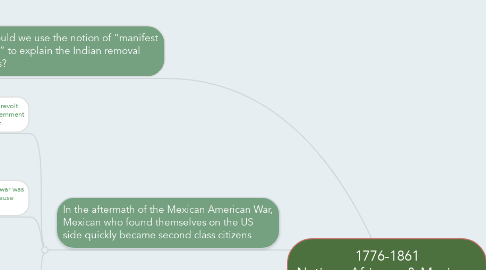
1. What impact did Jackson’s policies have on American Indians?
1.1. In readings nine we earned about the impact that was made towards the Indians and how men and women were treated differently and subordinated.
1.1.1. Jackson was viewed as a hero of the War of 1812
1.1.2. Jackson spoke about how governing Indian tribes.
1.1.3. An Indian who is as bad as the white men could not live in our nation; he would be put to death, and eaten up by the wolves.
2. How could we use the notion of “manifest destiny” to explain the Indian removal policies?
2.1. In reading five it talked about Manifest Destiny – a phrase used by leaders and politicians in the 1840s to explain continental expansion by the United States – revitalized a sense of "mission" or national destiny for Americans.
2.1.1. High birth rate and increases in population was happening due to immigration.
2.1.2. Indian Removal used Manifest by suffering in the economic system, there were fewer opportunities for individuals, discouraged people from settling into the areas, poverty, and restrictions affected the society as a whole.
3. In the aftermath of the Mexican American War, Mexican who found themselves on the US side quickly became second class citizens
3.1. In reading six we learned about the revolt against Mexico's new centralist government headed by President Antonio López.
3.2. In readings seven we learned how the war was one-sided view of this war, largely because we've seen it through our own side.
3.2.1. There is also a division of opinion between the Unites States and Mexico. Most opposed to war and three was different viewpoints, all of these voices, that we can really understand the complexity of this event.
3.2.2. The war certainly shaped the area in where we live today from Texas all the way to California.
3.2.3. We also don't speak much about this war because it was in Mexico's territory, so it becomes less important to America history.
3.3. In reading eight we leaned about violence and the violations that people experienced were not only in terms of taking away their lands or a taking away their livelihood but, also taking away their language.
3.3.1. The war was about violence, racism, appropriation and expropriation
3.3.2. Consequences of that conquest is how the was still has effect on us today. We are also less considered about earning the citizenship of that nation and more on working hard.
